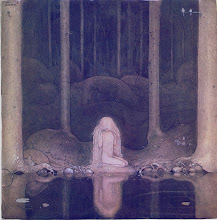För 1400 år sedan höll munken, sedemera helgonet, S:t Columcille - en av "Irlands tolv apostlar" - ett anförande som är förbluffande, för att inte säga parodiskt, dagsaktuellt.
Detta anförande utgör slutpläderingen i den process där han ställdes till svars för att år 550 olovligen ha kopierat ett utdrag ur Psaltaren, det första exemplar som anlänt till Irland, i sin tur ett utdrag ur Vulgata, en latinsk bibelöversättning.
S:t Columcille blev sedd, sägs det, natten då han mirakulöst kopierade verket i sin helhet - ivrigt skrivande, belyst av ett ljus som strålade ut från den andra handens fingrar.
Han var starkt övertygad om rättfärdigheten i sin gärning, men han utförde den mot sin åldrade mentor Finnian's vilja. Finnian hade hemfört verket från Rom, och ville ha det för sig själv. Inte bara boken, utan själva texten.
Helgonet och piratkopieraren S:t Columcille (521 - 597) säger:
“My friend’s claim seeks to apply a worn out law to a new reality. Books are different to other chattels (possessions) and the law should recognise this. Learned men like us, who have received a new heritage of knowledge through books, have an obligation to spread that knowledge, by copying and distributing those books far and wide. I haven’t used up Finnian’s book by copying it. He still has the original and that original is none the worse for my having copied it. Nor has it decreased in value because I made a transcript of it. The knowledge in books should be available to anybody who wants to read them and has the skills or is worthy to do so; and it is wrong to hide such knowledge away or to attempt to extinguish the divine things that books contain. It is wrong to attempt to prevent me or anyone else from copying it or reading it or making multiple copies to disperse throughout the land. In conclusion I submit that it was permissible for me to copy the book because, although I benefited from the hard work involved in the transcription, I gained no worldly profit from the process, I acted for the good of society in general and neither Finnian nor his book were harmed.”
Colmcille and the Battle of the Book: Technology, Law and Access to Knowledge in 6th Century Ireland av Ray Corrigan, (2008) Edinburgh University, School of Law
Översättningen gjord av författaren efter manuskriptet Betha Colaim Chille (1532), återgivet och även översatt av A. O’ Kelleher and G. Schoepperle i Betha Colaim Chille/ Life of Columcille (University of Illinois Press, 1918), sid 78-179, samt Lucy Menzies, Saint Columba of Iona (J.F.M. Books, 1992, utgiven första gången 1920), sid 25 och slutligen Padraic Colum, The Legend of Saint Columba (Sheed and Ward, London, 1936), sid 76-81.
Fortsättning följer
Om rådskommunismens relevans (ur OEI #104–105)
9 månader sedan
